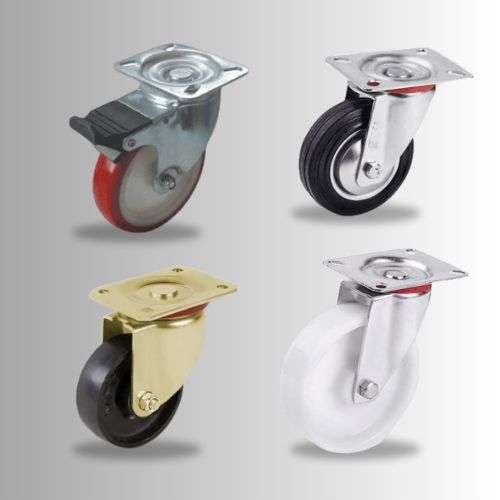
What is the common material of wheels in industrial uses?
The use of caster and wheels is of great importance in industry for ease of transportation. The use of caster and wheels in industry varies depending on the material of the wheel. Here we will introduce the materials used in caster and wheels production and which wheel is suitable for which conditions.
Cast iron
One of the materials used in making wheels is weather-resistant cast iron. This wheel is intended for extreme heat-resistant, high-payload applications.
Rubber
Rubber Wheels are the best choice if you need to protect your floor. These wheels also do not make much noise while moving. They are affordable, but the disadvantages of these wheels are their limited weight capacity and sensitivity to wear; this wears out over time due to their softness and also due to heavy loads.
Nylon
Wheels made of this material are resistant to all kinds of solvents and resistant to all weather conditions. It is resistant to heat, cold, and corrosive substances.
Nylon wheels have excellent resistance to chemicals, oils, and solvents, making them an ideal choice for environments where exposure to such substances is common.
However, since nylon is a harder material than rubber and polyurethane, it is likely to damage the floor Also these wheels have a noisy performance, which creates problems in areas such as healthcare centers or office areas.
Polyurethane
Polyurethane wheels are durable and extremely protective of the floor. These wheels are resistant to chemicals and abrasion, making them an ideal option for use in industry. Polyurethane wheels can carry more load than rubber wheels. Additionally, these wheels protect sensitive floors and do not cause any scratches. However, one of the disadvantages of these wheels is that their prices are higher than rubber wheels.
Pneumatic
Pneumatic wheels, which provide a comfortable ride, are filled with air and are suitable for use on uneven surfaces. This type of wheel is often used on garden carts.
These wheels need to be constantly inflated and have a lower load-carrying capacity than solid wheels.
Phenolic
Since phenolic is a hard material, wheels made of this material are resistant to chemicals, water, and oil. These wheels operate noisily and damage the floor due to the hard material. This rim is one of the cheap rims often used instead of steel rims.
Steel
These wheels are suitable for heavy applications due to their high strength. These wheels have a high loading capacity and are resistant to chemicals and high temperatures. However, these wheels are heavy and noisy. Since these wheels are heavy and made of hard material, they often damage the floor.
Many important factors should be taken into account when choosing the material of the wheels or wheel selection. 1. Load carrying capacity 2. Type of ground expected to be used with this wheel. 3. Resistance to chemicals and temperature.
4. Where this wheel is used – noise and vibration levels.
Based on these factors you can make an informed decision. If you need a more detailed check, our support team is available for full guidance.
Latest Developments
Explore to stay up to date with us.













